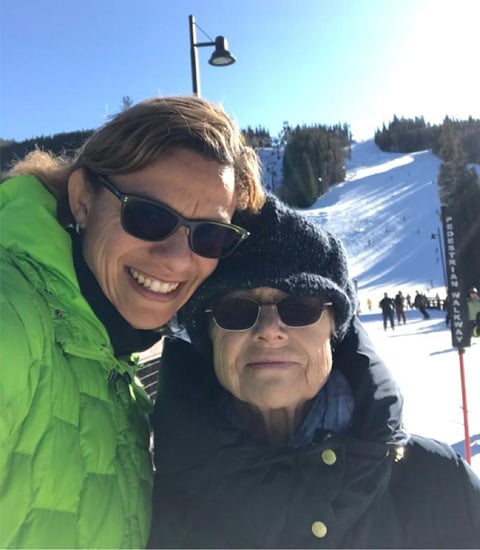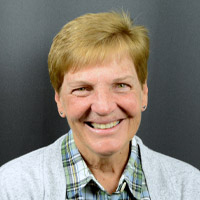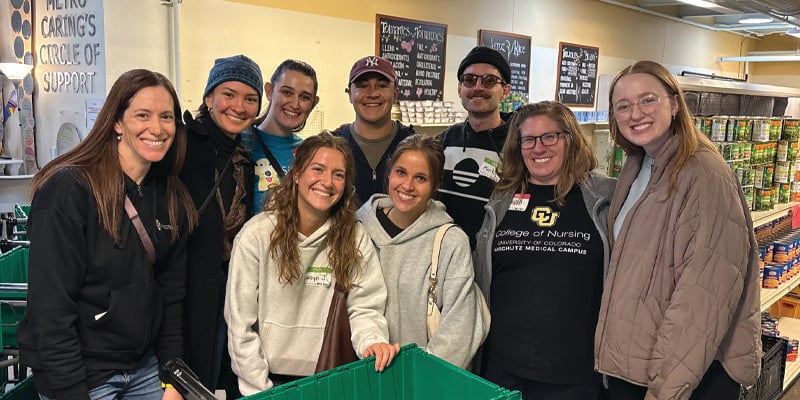“The nursing student connected so well with my mother that I requested she continue working with her even though a new cohort of students was supposed to take over,” said Natascha Palmer whose mother and father-in-law are both enrolled in the University of Colorado Anschutz Medical Campus program that matches health care students with seniors.
The program, titled Connecting Older Adults to Students through Interprofessional Telecare (COAST-IT), connects health care students at Anschutz Medical Campus to older adults in supportive and independent living with the goal of developing relationships. The brainchild of Sarah Tietz, MD, and her colleagues in the Division of Geriatric Medicine and its UCHealth Seniors Clinic, the program is administered through the CU Anschutz Multidisciplinary Center on Aging.
COAST-IT helps students practice their communication skills while breaking the cycle of isolation for older adults increasingly spending their days physically distanced from the outside world during a pandemic. When the program was in its inception, Dr. Tietz reached out to the College of Nursing and its Adult Gerontology Primary Care Nurse Practitioner (AGPCNP) Specialty Director Kim Paxton, DNP, to help devise and implement outreach to the isolated seniors of the geriatric clinic on the campus. AGPCNP graduate student leadership, led by Susan Hinz, AGPC-BC, collaborated with Tietz to design and implement the processes currently in use.

Natascha Palmer and her mother Ulrike Palmer |
Program Proves to be a Lifeline for One Family
“We live in Denver and my mother is in San Antonio. It worries me that she’s all by herself and that we can’t see each other,” said Natascha. Her mother, Ulrike Palmer, is an active 78-year-old. Up until March of 2020, she was still substitute teaching elementary school kids. But because of the pandemic and her age, she hasn’t stepped into a classroom in more than a year. “Teaching keeps me active and young,” said Ulrike.
“My mother is very independent. She loves to travel but hasn’t been able to do so because she’s been in isolation since the beginning of the pandemic. This program has helped keep her engaged with others and has become a lifeline for us,” said Natascha. Because of the daily hectic balance of work and home, Natascha doesn’t get to talk with her mother every day to check in with her. “Knowing that she is engaged and connecting with others in this program is a huge relief,” said Natascha.
Teamwork across disciplines
After the successful pilot project with the College of Nursing began in late March 2020, the program was rolled out to other health disciplines across campus where students have provided emotional and social support in an effort to decrease isolation and loneliness while improving their communication skills with older adults. The students also help arrange telehealth appointments and help the patients connect with their providers to answer questions about medical needs and prescription concerns. Armed with a manual and loose script to guide the conversation, along with what to do in case any medical questions or ‘red flag’ comments arise during their social time, students are prepared for what the patients might throw at them.
Nursing Student Creates a Special Bond
The relationship that University of Colorado College of Nursing student Kelly Hannon has created with Ulrike is unique. Every other Monday, Hannon and Palmer visit via phone. Some days it’s 20 minutes. Others it’s an hour or more.
“I get as much out of the calls as she does,” said Hannon, a student in CU Nursing’s Adult Gerontology Nurse Practitioner specialty. “She teaches me something every week.” In the beginning, the two talked about life. Now they know so much about each other that it’s like “talking with a friend,” said Hannon.
According to Ulrike, a self-professed introvert, “Kelly and I just clicked, and I really look forward to the conversations and the time we share.”
Providing Important Training for Students
Divided into teams with pharmacy, dentistry, and nursing students, the groups meet monthly, discussing patient experiences as well as case studies provided by the Division of Geriatrics. Case studies focused on geriatric issues, from osteoporosis and dementia to diabetes and falls, and were added to enrich the learning experience for students.
“This program is offering an important piece of training for our students to prepare them for real-life practice,” said CU Nursing Assistant Professor Kim Paxton, DNP. Family Nurse Practitioner students have recently joined the program as well.
Many participants, Hannon included, found the multidisciplinary aspect highly valuable. “Everyone brings something different to the table. Practicing interdisciplinary collaboration is a really useful tool for me in my career,” said Hannon.
For the Palmers, the program has helped bridge the long-distance gap and provided a much-needed connection.
“It’s a wonderful program. I wish it were available to anyone,” said Ulrike.




